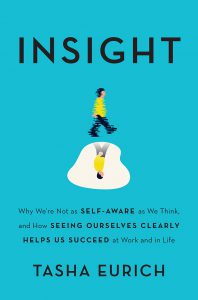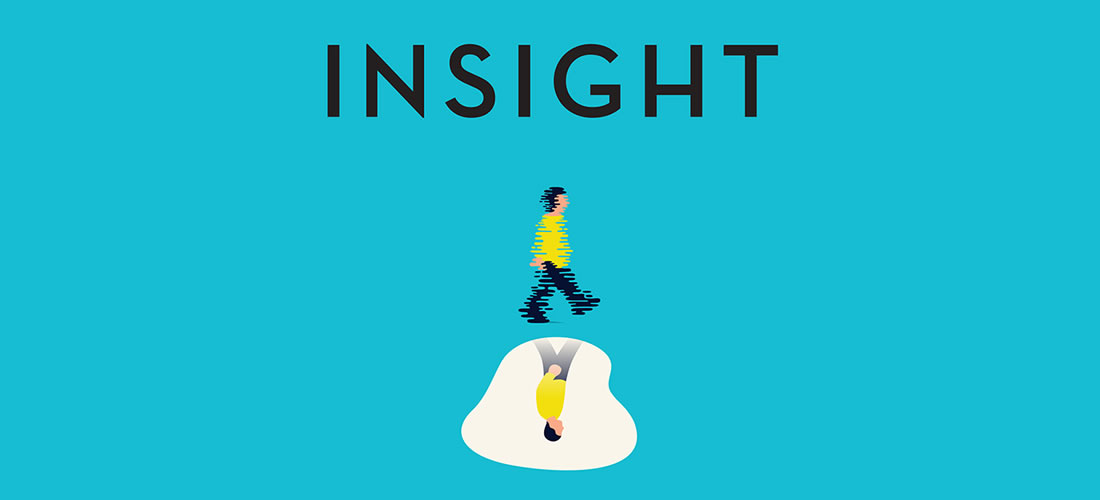 In a world where we tweet at each other instead of listen to each other, where style trumps substance, and where he who talks the loudest is most likely to be heard, it’s easy to lose sight of who we really are, and how others really see us. In the vein of Quiet, INSIGHT: Why We’re Not as Self-Aware as We Think, and How Seeing Ourselves Clearly Helps Us Succeed at Work and in Life (Crown Business; May 2017) takes us on a journey of self-exploration, showing us how to survive and thrive an increasingly delusional world.
In a world where we tweet at each other instead of listen to each other, where style trumps substance, and where he who talks the loudest is most likely to be heard, it’s easy to lose sight of who we really are, and how others really see us. In the vein of Quiet, INSIGHT: Why We’re Not as Self-Aware as We Think, and How Seeing Ourselves Clearly Helps Us Succeed at Work and in Life (Crown Business; May 2017) takes us on a journey of self-exploration, showing us how to survive and thrive an increasingly delusional world.
An excerpt is below and you can find the full book here.
The Evil Twin of Introspection
Integrating hundreds of studies with her own three-year research program, her fifteen years of work in the Fortune 500 world, and accounts from leaders like retired Ford CEO Alan Mulally and Ed Catmull of Pixar and Disney Animation and others who have made dramatic gains in self-awareness, Dr. Tascha Eurich shatters conventional assumptions about what it takes to truly know ourselves—and offers surprising secrets, techniques, and strategies to help us become more self-aware, and therefore improve our work performance, career satisfaction, leadership potential, relationships, and more.
Check out an excerpt from her latest book, INSIGHT: Why We’re Not as Self-Aware as We Think, and How Seeing Ourselves Clearly Helps Us Succeed at Work and in Life, below.
John Milton once said that the mind “can make a heaven of hell, and a hell of heaven.” At some point, I’m sure that you too have found yourself stuck in an endless loop of self-scrutiny—almost everyone does. We might replay a certain conversation in our minds, beat ourselves up about something we did (or didn’t do), or twist ourselves into mental knots trying to figure out why we’re not the person we want to be. How could I have embarrassed myself in front of all those people? Why am I still in this horrible relationship? Why can’t I stop eating those damn cookies and finally lose this holiday weight? And as anyone who has gotten stuck in this cycle knows, we don’t ask ourselves these questions once or twice or even three times—but over and over, to the point that we can think of little else.
This single-minded fixation on our fears, shortcomings and insecurities has a name: it’s called rumination, and it’s introspection’s evil twin.* And as you may have guessed, in addition to simply being a mental hell, rumination is also a huge barrier to insight. And once we fall down the rabbit hole, it’s tough to claw our way out. Sometimes it even gets to the point of ruminating that we can’t stop ruminating!
I believe there is a nefarious character buried deep within each of us. The Ruminator is ready at a moment’s notice to second-guess our choices and remind us where we come up short. Sometimes, when this sly, stealthy creature kicks us down his evil spiral, we are fully aware that it’s happening, though we feel helpless to stop it. But other times, and far more dangerously, the Ruminator tricks us into believing that we’re engaging in productive self-reflection. After all, why else would we put ourselves through such mental self-flagellation if not to gain insight? I sometimes even hear people use the word “ruminate” as a synonym for “reflect” (i.e., “that’s an interesting question. Let me ruminate on it for a few days.”) This is why rumination is the most insidious of all the follies: not only does it effectively prevent insight, it can masquerade as productive self-reflection. And when it comes to self-awareness, if introspection is disruptive, rumination is disastrous.
At this point, you may be recognizing yourself more and more in descriptions of such behavior. We all do it, though some more than others (and by the way, you can get a read on how often you ruminate by taking the assessment in appendix K). And although we can ruminate on just about anything, research has shown that we do it most when we feel we don’t measure up in an area that’s especially important to us. A chronic people-pleaser might ruminate about deeply upsetting a close friend; a workaholic might ruminate about a poor performance rating; a devoted mother might ruminate after her surly teenager tells her she’s the worst mom ever.
But “normal” or not, rumination might be costing you more than you think. My own research has shown that frequent ruminators are less satisfied with their lives and relationships, feel less control over their destiny, and are generally less happy. Other research has shown that rumination is related to lower grades, impaired problem solving, worse moods, and poorer-quality sleep.
And when it comes to our mental health, rumination can be a sad, vicious cycle. For example, people who experience depression are more likely to get stuck in ruminative thought patterns, causing them to focus more on their depression and, as a result, feel even worse. Ruminators are also more stressed and anxious even in the absence of depression. In one of the largest studies on stress to date, a survey of more than 32,000 people from 172 countries found that while the number and severity of negative events in people’s lives were the biggest predictors of mental health problems, their rumination levels were also a significant factor in how much stress and anxiety they experienced.
In INSIGHT, we learn that introspection can be an obstacle to insight. If that’s the case, rumination might as well be a 50-foot-high blockade. When we’re ruminating, we’re spending so much energy looking at what’s wrong with us that we have no mental energy left to explore any of the pillars of insight. As one of our unicorns said, “If we spend too much time scrutinizing what’s in our rearview mirror, we’re certain to crash into a light post.” That’s why research shows that despite incessantly processing their feelings, ruminators are less accurate at identifying their emotions: their minds are so laser-focused on an incident, reaction, or personal weakness that they can miss the larger picture.
Another reason rumination is an enemy of insight is that it’s effectively an avoidance strategy. This might seem odd, given that the process involves endlessly dwelling on our problems. But in reality, when we obsess over the causes and meaning behind negative events, we keep the emotions that come with them at arm’s length, which can often be even more painful for us than the act of ruminating. Indeed, there is a correlation between rumination and other avoidant coping strategies like drinking. In one study of people who had just completed a rehabilitation program for alcohol abuse, ruminators were 70 percent more likely than non-ruminators to relapse to their previous drinking levels. Ruminators have also been shown to avoid the people and situations causing them to ruminate instead of dealing with them directly.
For all these reasons, rumination clearly hurts our ability to accurately read our internal selves. But even though the process is largely an inwardly focused phenomenon, it can also hurt our external self-awareness. For one thing, ruminators are so busy looking inward that they neglect to think about how they are showing up to others. They generally ignore or avoid feedback, lest it send them down the rabbit hole. They therefore tend not just to be poor perspective-takers, but also to be more narcissistic and self-absorbed than non-ruminators.
Now, it’s tempting to assume that self-awareness unicorns are blissfully unencumbered by the malevolent malady of rumination. After all, they are unicorns, right? But even though they ruminate much less often than the rest of us, they aren’t immune—only 7 percent reported never doing so. But we did find that they used two slightly different tactics.
First, unicorns were better at recognizing when the Ruminator was creeping up on them and subsequently better at stopping him in his tracks. In fact, roughly three-fourths employed specific rumination-busting strategies, which we’ll discuss in a moment. Second, they had a more self-accepting attitude about rumination in general. One unicorn, a former teacher and stay-at-home mom of four, explained that “the goal can’t be rumination zero. It is a part of life. My goal is to identify it as quickly as possible, work on a strategy to get out of it, and not be upset with myself about doing it.” Another unicorn (okay, it’s my sister Abby, whom we’ll meet very soon) told us that “rumination is like a storm. It comes through, rains on everything, and then when it’s done, there is blue sky. Funnily, one way I deal with rumination is to not worry about it!”
Reprinted (or Adapted) from INSIGHT: Why We’re Not as Self-Aware as We Think, and How Seeing Ourselves Clearly Helps Us Succeed at Work and in Life © 2017 by Tasha Eurich. Published by Crown Business, an imprint of Penguin Random House LLC.
About the Author
 Dr. Tasha Eurich is an organizational psychologist, researcher, and New York Times bestselling author (Bankable Leadership). With a PhD in organizational psychology, she is also the founder of The Eurich Group, where she’s helped thousands of leaders and teams improve their effectiveness through greater self-awareness. Dr. Eurich has contributed to Entrepreneur, CNBC.com, and The Huffington Post, and has been featured in outlets such as Forbes, The New York Times, Fast Company, and Inc. She’s been named one of Denver Business Journal’s ”40 Under 40” as well as a “Top 100 Thought Leader” by Trust Across America, and in 2015 she was named a “Leader to Watch” by the American Management Association. Her TEDx talk has been viewed more than a million times.
Dr. Tasha Eurich is an organizational psychologist, researcher, and New York Times bestselling author (Bankable Leadership). With a PhD in organizational psychology, she is also the founder of The Eurich Group, where she’s helped thousands of leaders and teams improve their effectiveness through greater self-awareness. Dr. Eurich has contributed to Entrepreneur, CNBC.com, and The Huffington Post, and has been featured in outlets such as Forbes, The New York Times, Fast Company, and Inc. She’s been named one of Denver Business Journal’s ”40 Under 40” as well as a “Top 100 Thought Leader” by Trust Across America, and in 2015 she was named a “Leader to Watch” by the American Management Association. Her TEDx talk has been viewed more than a million times.






